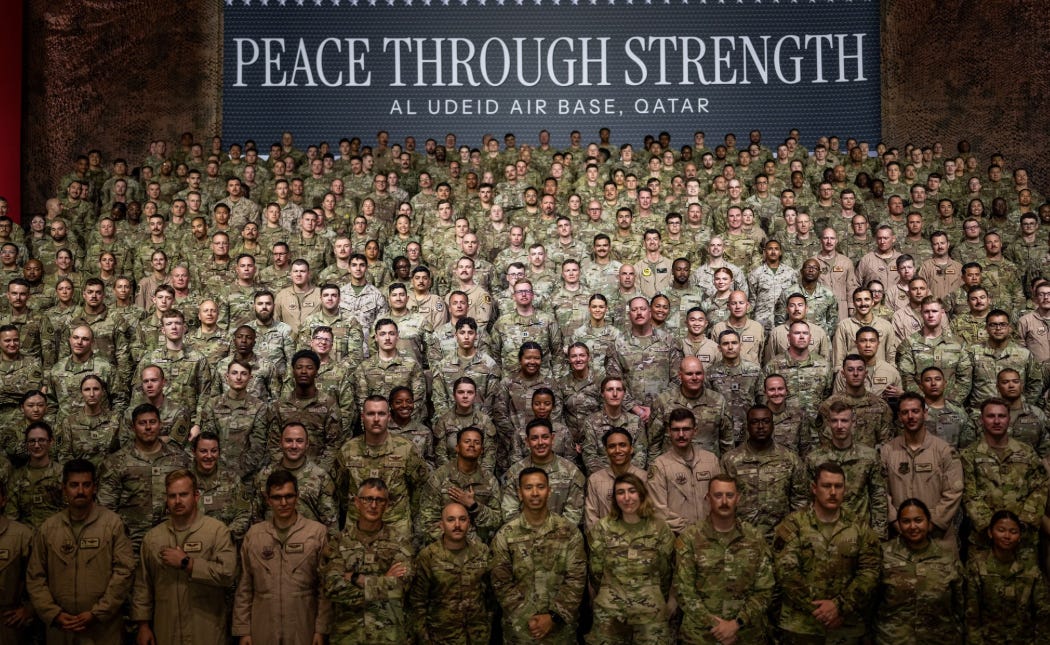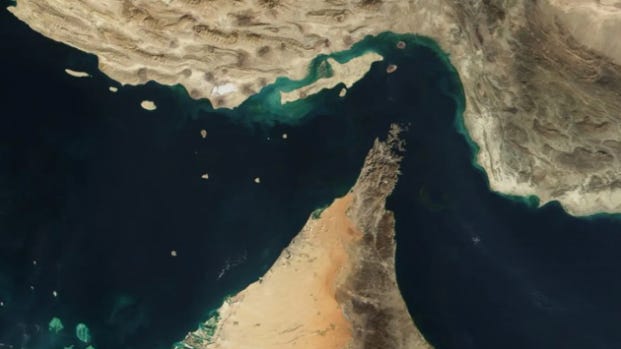(Dobbs) The Imagination Can Only Run Dark And Wild
Iran "is not going to win militarily, but it’s trying to ensure that there are only losers here.” We don’t want to be one of them.
Some might take issue, but I’d argue that for the United States, there is no right or wrong. Actively and openly joining Israel’s war against Iran might be the best answer to the Islamic Republic’s defiant threats against Western nations, but it also might open a Pandora’s box that makes the world as unstable and unsafe as ever.
That is to say, there are several choices but they all are risky ones, maybe even downright bad ones. Going the ultimate distance and contributing our unparalleled firepower— in the form of B-2 bombers and bunker-busting bombs— to take out the best-protected installation in Iran’s nuclear program, buried deep in a mountain in northern Iran, can end up doing as much harm as good.
Almost nobody in the West argues that we should let Iran keep moving closer to the successful production of a nuclear weapon, but many argue that it will come at a terribly high price.
Iran could launch missiles toward American military bases in the region. We have troops in Kuwait, the United Arab Emirates, Iraq, and Bahrain, with the largest contingent— 10,000 U.S. military— at our biggest base in the neighborhood, the Al Udeid Air Base in Qatar, also the headquarters of the U.S. Central Command. Qatar is right across the Persian Gulf from southern Iran. That means Iran’s short-range missiles are only minutes away.
The United States is taking such threats seriously enough that we are redirecting a third aircraft carrier group, the Nimitz and its accompanying warships, from the Pacific to the Middle East, along with the repositioning of refueling and heavy transport aircraft from their American bases to air bases in Europe.
Iran could block the Straits of Hormuz, a narrow but critical passage between the Persian Gulf and the Gulf of Oman. It is the only way out for up to a quarter of the world’s oil and gas from the Persian Gulf to the open sea. Supertankers’ hulls can reach more than 75 feet below the surface of the water, which is why the navigable part of the straits, the part though which they can pass, is only some two miles wide. In an opening that narrow, Iran could set mines or even sink ships to cut if off. The global economy would take a painful hit.
Just for good measure, the Iranian-backed Houthis, who have not been totally tamed, could resume their own attacks on Western ships navigating the Red Sea on their way to the Mediterranean via the Suez Canal.
Iran could go all-in on terrorism. Just as the Pentagon always has contingency plans to confront hostile enemies, it is believed that Iran has contingency plans for devastating terrorist acts against enemies of its own. I started hearing “Death to America” on the streets of Iran 45 years ago, and although it always has sounded like empty rhetoric, it has become the nation’s enduring slogan. Might Iran’s leaders now see it as their “final solution?” Might they finally pull the trigger and turn those contingency plans into action? They are not in fact capable of driving America to its death, but they have far more resources than al-Qaeda had almost 25 years ago and the damage it did on 9/11 brought a permanent change to our sense of security. It also killed almost 3,000 people.
When Iran’s supreme leader threatens “irreparable damage” if the U.S. gets more actively involved, could these be the irreparable damage he has in mind? Could any or all of them explode from the Pandora’s box that’s caught in the crossfire? As Ellie Geranmayeh of the European Council on Foreign Relations said this week on CNN, “Once you open up this Pandora’s box, we have no idea where things go.” That’s because there are more wild cards than aces in that box.
One wild card is the bunker buster itself. Weighing in at fifteen tons with three tons of high explosives in the fuse, it is believed to be the only weapon that could actually eviscerate Iran’s massively fortified uranium enrichment installation called Fordow. With a reported ability to drill some 200 feet into the ground, it would require pinpoint penetration after pinpoint penetration to make its way to the enrichment plant some 300 feet deep in the mountain. But it has never actually been used, which means any confidence in its success is based on theoretical assumptions. They might be right, but still, they are only assumptions.
Another wild card is the stockpiles of both the Israelis and the Iranians, who keep firing offensive missiles and drones at each other’s cities and defensive missiles at the incoming weapons to fight them off. Is either side on the verge of running out? If so, which one? It could be likened to a game of chicken.
Yet another is the people themselves. Beginning with the people of Iran.
Over the years that I reported from the Middle East and elsewhere, I saw colossal crowds demonstrating for or against their governments. But just because a crowd stretched far beyond what the eye could see, I never reported that “a majority” of people felt one way or another, because in countries with no reliable public polling, that’s just not a conclusion anyone can accurately reach. Although huge crowds in recent years in Iran have publicly protested against their government, it doesn’t mean that now, under common attack from Israel, they see the Jewish state as their savior, let alone want it to succeed.
There also is the question of Iran’s leaders. Although many probably have escape hatches to save their own skins— just like what we recently saw with Bashar al-Assad fleeing from Syria— would they be willing to watch their defenseless countrymen go down in flames if it meant they could take down their enemies with them? It was their kind of radical fundamentalist Islamic ideology that spawned suicide bombers. The same fanaticism could guide their actions now.
And what happens if Israel’s strategy, and America’s, is to force regime change? What we saw in the aftermath of regime change in Iraq, and later in Libya, does not inspire confidence that it wouldn’t set the whole nation on fire, and possibly lead to the birth of new terror groups who want to set fires well beyond their own borders.
Another wild card is a history of American hubris. It is a combination of confidence and conceit. From Vietnam to Iraq to Afghanistan, we have made bad assumptions before about the infallible and swift success of American power. As New York Times writer Elisabeth Bumiller put it, they have become historic lessons “of miscalculation and unintended consequences.”
Yet another wild card is our goal. Is it regime change? Is it the assurance that Iran will not have a nuclear weapon? Just a week ago, Israel’s prime minister Netanyahu called the bombs he was dropping over Iran a “preemptive action.” But from the nature of its attacks, this war already has mushroomed into something more. As the United States has learned at great human and financial cost over the decades— Iraq and Afghanistan are only recent examples— these things have a tendency to proliferate into a succession of goals and a flood of firestorms we cannot stuff back into a hole.
A big wild card is Donald J. Trump, who acts on impulse and has an infamous incapacity to take advice from subordinates who know more than he does and, for that matter, an equally infamous incapacity to even believe there’s anyone who knows more than he does. He has moved from the president who promised to measure success by “the wars we never got into” to the president who calls for Iran’s “unconditional surrender” and threatens its leader by posting, “We know exactly where the so-called ‘Supreme Leader’ is hiding. He is an easy target, but is safe there—- We are not going to take him out, at least not for now.”
Finally, the wild card that no one is publicly talking about yet: Israel’s own nuclear weapons. It has never openly acknowledged that it has them but it is common knowledge, and estimates by different military and scientific think tanks put the number somewhere between 90 and 400 warheads. They believe Israel can deliver them from the air, from the land, and from the sea.
If they are meant to serve as a deterrent to enemies like Iran, arguably they’re no longer working, which might mean that the biggest wild card of them all would be an Israeli nuclear attack on Iran. Basically, to burn the Islamic Republic down. The ramifications of that? The imagination can only run dark and wild.
According to White House press secretary Karoline Leavitt, the U.S. is in contact with Iran. Yesterday she said, “I can confirm that correspondence has continued.” Then in the White House briefing room she read a statement from Trump himself, which said that because he still believes there is a “substantial chance of negotiations,” he’ll make a final decision about what to do “within the next two weeks.” This could mean one of several things. First, that Trump wants to pick up the talks where they left off. Or second, that Trump doesn’t know himself what he needs to do to realize his dream of being remembered as a peacemaker but isn’t ready yet to let that die. Or third, that Trump wants to see whether Israel can finish the job without direct American help.
The last wild card.
There is no question about whose side the United States is on in this war. Israel’s. There is no question about whether we want Iran to have nuclear weapons. We don’t. The question is about whether we can stop their development without suffering ramifications we would regret. As the European Council on Foreign Relations’ Ellie Geranmayeh said, Iran “knows it is not going to win militarily, but it’s trying to ensure that there are only losers here.”
We don’t want to be one of them.
Over more than five decades Greg Dobbs has been a correspondent for two television networks including ABC News, a political columnist for The Denver Post and syndicated columnist for Scripps newspapers, a moderator on Rocky Mountain PBS, and author of two books, including one about the life of a foreign correspondent called “Life in the Wrong Lane.” He also co-authored a book about the seminal year for baby boomers, called “1969: Are You Still Listening?” He has covered presidencies, politics, and the U.S. space program at home, and wars, natural disasters, and other crises around the globe, from Afghanistan to South Africa, from Iran to Egypt, from the Soviet Union to Saudi Arabia, from Nicaragua to Namibia, from Vietnam to Venezuela, from Libya to Liberia, from Panama to Poland. Dobbs has won three Emmys, the Distinguished Service Award from the Society of Professional Journalists, and as a 39-year resident of Colorado, a place in the Denver Press Club Hall of Fame.
You can learn more at GregDobbs.net












Greg
This is a very clear message . We all remember Vietnam, Afghanistan and Iraq.
Brewster Boyd
Thanks Greg… very good exposition of a complicated situation. im in the Taco T camp and think T wont engage and so the job of eliminating Irans threat wont be possible for Israel the hateful Ayatollah will survive and this scenario will pause and resume in. Few years